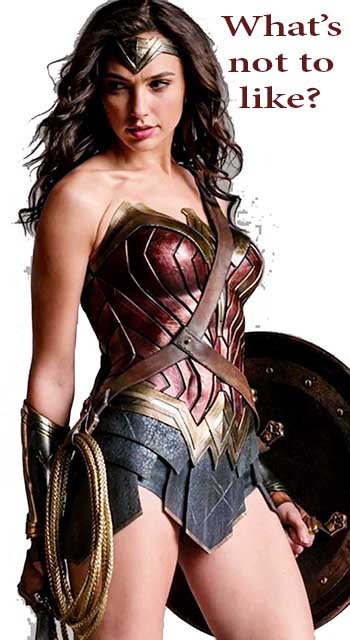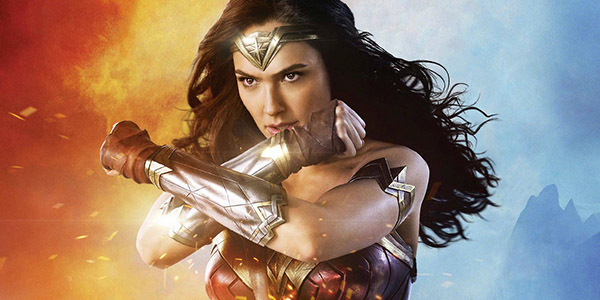This year’s Rorschach test of cultural gender norms and aspirations turns out to be Wonder Woman.
In case you haven’t heard, the director is a woman. And unlike ALL other superhero tales, its protagonist is a woman.
That makes it a woman’s movie, I guess.
Some thought it would fail. Some thought teenage boys wouldn’t watch an Amazonian pinup. Some thought it was too earnest – it didn’t wink at the audience and pretend valor is a lie.
It’s taken years of discarded drafts and recastings — dashing the dreams of whole generations of fans…
 But summer 2017 beheld her glory and as of late September, Wonder Woman banked over $400M at the box office and is hailed as one of the best movies of the year…
But summer 2017 beheld her glory and as of late September, Wonder Woman banked over $400M at the box office and is hailed as one of the best movies of the year…
So why am I still disappointed?
Wait, did I just say there’s something WRONG with Wonder Woman? But it made $400M! It’s iconic. I’ve heard it’s the model for the modern woman! A template for a Christian woman! Wonder Woman is an inspiration for every girl around the world. She’s modern! She’s everything everyone’s ever wanted!
No. And before the epithets fly, let me say that I enjoyed most of it.
I mean, what’s not to like about a sex fantasy superhero in a gladiator dominatrix outfit and lasso? She’s a model of envy and body issues for girls (Barbie included), puberty ignition for boys.
A gal like Gal is sure easy on the eyes.
It’s only when you look closely at the first act set up, implications of the third act, and the theme that you really get true sense of the problem.
**MAJOR SPOILER ALERTS AHEAD **
Wonder Woman’s Set up Problems
Am I to understand that Diane’s mother Hippolyta, knowing that Diane’s destiny is to be a warrior goddess oracle for the world (and god-killer), REFUSES to train her like EVERY other women on the island because this anywhere/everywhere god Ares – who might never return, and who might be dead – might find her sooner?
In other words, the beginning drama depends on false conflict.
Diana’s purpose is to wield that sword, lasso the truth from naughty naughty men, cross her arms, and guide humanity. She lives among immortal warrior chicks dedicated to martial training since before history. And FYI, based on her bedtime story, the whole island and that female Roman army exist only to protect her until she’s ready.
So what was Hippolyta’s curriculum for Diana before her sister started training her? Learning to love? We don’t see any of that.
Even as an adult, Diana is still “ignorant of many things” about the world and humanity, but hasn’t she been growing up for THOUSANDS of years? She knows multiple modern languages and ancient Greek but she doesn’t know that every culture sends men to fight in wars?
I know. I know: because Ares will find her sooner. In other words, ignorance is bliss (and it’s not).
As writers, we know that one key to creating empathy in act one is to put the protagonist at a disadvantage, to make her unfairly treated. Hippolyta thwarting her destiny makes sense conceptually, but make it reasonable, or you annoy the audience.
And on that subject, what’s up with her cross-arm defense as offense thing anyway? It’s never explained, and considering it’s the move that actually resolves the Ares conflict, don’t you think we need something? Is she harnessing the power of Zeus or are the bracelets the true super part of this hero?

Wonder Woman’s Moral Problems
I get why Steve doesn’t assume he can sleep with Diana on the boat. I don’t get why can’t he articulate the simplest concept of chivalry or gentlemanly behavior. The year is around 1917 so he’d know unless he was educated under third-wave feminism in 2015.
The scene exists so the writers can tell impressionable young girls that marriage is pointless. While they may need men for procreation, they’re NOT necessary for sexual pleasure.
Yeah. That won’t leave any impact on culture.
Sorry but the above plus most of Diana’s interactions in London show that she has no filter (some might just call her bossy), no cultural sensitivity (I hear that’s all the rage these days), and in case anyone noticed, she has no problems kill anyone who stands in her way (hey, if Batman and Green Arrow can’t…).
Yes, she is also passionate, loyal, trustworthy, brave, opinionated, and absurdly hot.
Am I missing something?
Look, I like indestructible, naive supers as much as the next guy, but when you establish a character, give the audience a sense of danger. What is Diana’s weakness?
In the first battle with men, Diana gets cut on the arm, but after that, not a scratch. Could she die if actually shot? Could she get distracted or does she have a spidey sense about bullets? Or do her bracelets attract bullets like a magnet?
It would help the sequel to know if there are any boundaries to her power.
Act Three Problems
Wonder Woman’s third act falls apart on two basic fronts. First, “Deus Ex Machina,” which refers to a storytelling flaw where anything outside of the protagonist resolves the conflict of the story.
In Wonder Woman, regardless of how many times Diana says Ares is real, the essential conflict is the nerve gas bomb meant to overthrow the negotiations. Once that’s taken care of, the story is over.
So, who resolves the movie’s central conflict? Steve.
He becomes the story’s hero in a very traditional way: he tells the girl he loves her, and then he goes off and sacrifices himself to save the world.
End of story. Officially. (Since Diana is a god, would this be humanus ex machina?)
In fact, without Diana, the story of Steve Trevor almost single-handedly defeating a German chem warfare conspiracy that threatens to overthrow the peace negotiations is really cool.
Second, Wonder Woman tangles with Ares. You see, if she kills the god of war, there would be no war, because war is bad and wars start only because gods, um, you know, whisper hate to them, or something.
And, and let’s not forget Ares’ goal is to turn Diana against humans because then they could destroy mankind and rule in a new paradise. Or something. Because man is weak, cruel, capable of… stuff.
Even for a superhero tale, this is pathetically simplistic.
Plus, putting aside the odd Christianization of Greek mythology, how is Ares too weak to stop mankind from ruining the planet but he’s strong enough to whip steel and concrete around like Magneto? Throw bolts of lightning like Zeus? Flit through the air and whisper invisibly to any and every man?
To me, it sounds like the writers don’t have a firm grasp of their material.
Thematic Problems
But for Diana, it’s a moral argument:
“It’s not about deserve. It’s about what you believe. And I believe in Love.”
So she receives all of his hate power lightning, leaps in the air in the shape of the cross – and then blasts back onto Ares with her arms crossed.
So hang on: the god of war is defeated because she has the capacity to love?
Sorry to report, but people go to war over what they love. Wars start because violent aggressors (who also love many things) try to massacre people (and their loved ones) and steal their possessions. Two world wars started because Germans saw the chance to make the world better for their people, whom they loved.
The capacity is not the point. It’s in what you believe:
- Sargent York went into WWI because he loved God and country more than his safety.
- Hitler loved Aryans.
- Mao loved his people.
- Hirohito loved his people.
- Stalin loved…
Well, Stalin probably hated everyone, but the point remains that it doesn’t matter what the feelings are. If the end justifies the means, emotions are merely tools.
Yes, I realize it’s just a comic book movie. We’re not reviewing Judgment at Nuremberg here, but the writers had the knowledge of world history from Cain through the 20th century to reflect upon before writing the moral center of this movie and this is all they came up with?
The Cultural Discussion
I fail to see how Wonder Woman is a model for girls. Yes, she knows her boundaries, enjoys the little things in life, and holds others up to high standards, but she fails to comprehend physical danger, and runs roughshod over conventions, both of which can be detrimental for girls to emulate.
I especially don’t see how she’s a model for Christian girls. She’s not chaste. He slept with Steve in Veld. She doesn’t value marriage, or modesty, or humility. She not only disobeyed her mother, she deceived her repeatedly.
I believe girls can find better models in the world.
Well, perhaps not in the comic book world.
Last point: I can think of another female-driven tale about a woman with unspecified powers who rose above bad parenting, to overcome bad bad men and thus become an icon of girrrrrl-power. It too was a female lead movie phenomenon that also made $400M…
Frozen.
Ilsa’s parents are told that because her powers will get stronger she needs to learn to control it, so her parents stupidly segregate Isla and tell her to “conceal, don’t feel.” Sounds a lot like Hippolyta ignoring Diana’s destiny, doesn’t it?
And what about the unspecified powers, the “act of true love thaws a cold heart” theme?
From a writer’s perspective, I’d say somebody’s sharing story elements.
More problematic is that both movies discourage traditional romantic love and marriage. In fact, comic book fans are begging – begging – writers to make Wonder Woman a lesbian in the sequel!
I’m no conspiracy theorist, but I don’t think it takes one to see that Hollywood is pushing many questionable morals on the culture, and it starts as early as a Disney musical like Frozen.
On the whole, Wonder Woman is good entertainment. Again, I thought Steve’s heroism was great to behold, and partly because we know he could die. He almost died at the beginning.
Hollywood’s writers need to be wary of the drinking from the same story cistern, or we’ll end up with a bunch of derivative movies. Worse, we need to be wary of the false values that like Ares whisper past the filter and corrupt us and our culture.
